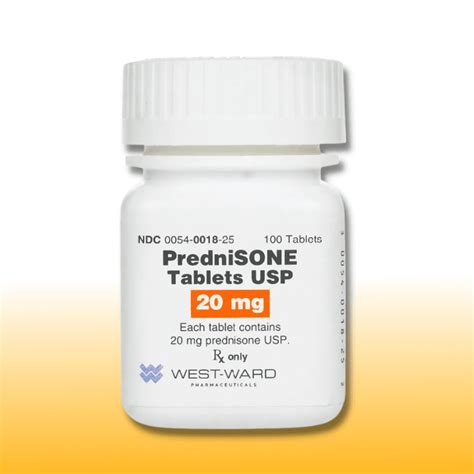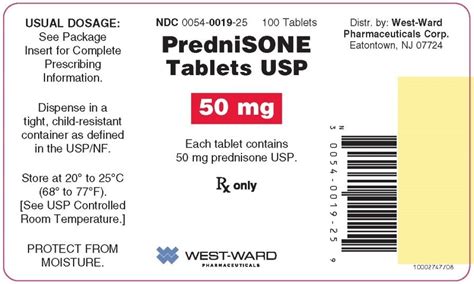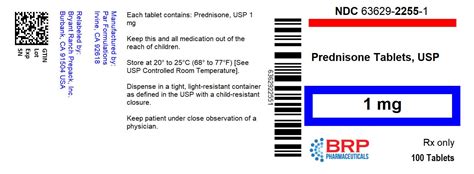Intro
Discover 5 key uses of Prednisone, a versatile steroid medication, for treating inflammation, autoimmune diseases, asthma, and more, exploring its benefits and applications in reducing swelling, relieving pain, and managing chronic conditions.
Prednisone is a synthetic corticosteroid that has been widely used in the medical field for its potent anti-inflammatory and immunosuppressive properties. It is a synthetic version of cortisol, a hormone produced by the adrenal gland, and is used to treat a variety of conditions. The importance of prednisone lies in its ability to reduce inflammation, suppress the immune system, and relieve symptoms associated with various diseases. With its widespread use, it is essential to understand the different applications of prednisone and its benefits in treating various medical conditions.
Prednisone has been a cornerstone in the treatment of numerous diseases, including autoimmune disorders, allergic reactions, and respiratory conditions. Its effectiveness in reducing inflammation and suppressing the immune system has made it a vital medication in modern medicine. The versatility of prednisone is evident in its ability to treat a range of conditions, from mild allergic reactions to life-threatening autoimmune disorders. As research continues to uncover the potential benefits of prednisone, its use is likely to expand, making it an essential medication in the medical field.
The use of prednisone has been extensively studied, and its benefits have been well-documented. It is a medication that has improved the quality of life for millions of people worldwide, providing relief from debilitating symptoms and reducing the risk of complications associated with various diseases. With its ability to reduce inflammation, suppress the immune system, and relieve symptoms, prednisone has become an indispensable medication in modern medicine. As we delve into the different uses of prednisone, it is essential to understand its mechanisms, benefits, and potential side effects to appreciate its significance in the medical field.
Introduction to Prednisone

How Prednisone Works
Prednisone works by mimicking the effects of cortisol, a hormone produced by the adrenal gland. It binds to specific receptors in the body, reducing inflammation and suppressing the immune system. This mechanism of action makes prednisone an effective medication for treating conditions characterized by inflammation and immune system dysfunction. By reducing inflammation and suppressing the immune system, prednisone provides relief from symptoms associated with various diseases, improving the quality of life for patients.5 Uses of Prednisone

Autoimmune Disorders
Prednisone is commonly used to treat autoimmune disorders, such as rheumatoid arthritis, lupus, and multiple sclerosis. These conditions occur when the immune system mistakenly attacks healthy tissues, leading to inflammation and damage. Prednisone reduces inflammation and suppresses the immune system, providing relief from symptoms and reducing the risk of complications.Allergic Reactions
Prednisone is also used to treat allergic reactions, such as asthma, hives, and allergic rhinitis. It works by reducing inflammation and suppressing the immune system, providing relief from symptoms such as itching, swelling, and difficulty breathing.Respiratory Conditions
Prednisone is used to treat respiratory conditions, such as chronic obstructive pulmonary disease (COPD) and pneumonia. It reduces inflammation and suppresses the immune system, providing relief from symptoms such as coughing, wheezing, and shortness of breath.Skin Conditions
Prednisone is used to treat skin conditions, such as eczema, psoriasis, and dermatitis. It reduces inflammation and suppresses the immune system, providing relief from symptoms such as itching, redness, and swelling.Eye Conditions
Prednisone is used to treat eye conditions, such as uveitis and conjunctivitis. It reduces inflammation and suppresses the immune system, providing relief from symptoms such as redness, itching, and blurred vision.Benefits of Prednisone

- Reduced inflammation: Prednisone reduces inflammation, providing relief from symptoms associated with various diseases.
- Suppressed immune system: Prednisone suppresses the immune system, reducing the risk of complications associated with autoimmune disorders.
- Relief from symptoms: Prednisone provides relief from symptoms such as itching, swelling, and difficulty breathing.
- Improved quality of life: Prednisone improves the quality of life for patients, allowing them to manage their conditions and reduce the risk of complications.
Side Effects of Prednisone
While prednisone is an effective medication, it can cause side effects, particularly when used long-term. Some of the common side effects of prednisone include:- Weight gain
- Mood changes
- Insomnia
- Increased appetite
- Water retention
It is essential to discuss the potential side effects of prednisone with your doctor and monitor your condition closely to minimize the risk of complications.
Precautions and Interactions

- Blood thinners
- Diabetes medications
- Blood pressure medications
- Antidepressants
It is also essential to take precautions when taking prednisone, particularly when used long-term. Some of the precautions include:
- Monitoring blood sugar levels
- Monitoring blood pressure
- Avoiding close contact with people who have infections
- Getting regular check-ups with your doctor
Conclusion and Future Directions
In conclusion, prednisone is a versatile medication that has improved the quality of life for millions of people worldwide. Its ability to reduce inflammation, suppress the immune system, and relieve symptoms has made it an essential medication in modern medicine. As research continues to uncover the potential benefits of prednisone, its use is likely to expand, making it a vital medication in the treatment of various diseases. It is essential to discuss the potential benefits and risks of prednisone with your doctor and monitor your condition closely to minimize the risk of complications.What is prednisone used for?
+Prednisone is used to treat a variety of conditions, including autoimmune disorders, allergic reactions, and respiratory conditions.
How does prednisone work?
+Prednisone works by reducing inflammation, suppressing the immune system, and relieving symptoms associated with various diseases.
What are the potential side effects of prednisone?
+The potential side effects of prednisone include weight gain, mood changes, insomnia, increased appetite, and water retention.
Can prednisone interact with other medications?
+Yes, prednisone can interact with other medications, including blood thinners, diabetes medications, blood pressure medications, and antidepressants.
What precautions should I take when taking prednisone?
+It is essential to monitor your blood sugar levels, blood pressure, and get regular check-ups with your doctor when taking prednisone.
